|
|
|
Sort Order |
|
|
|
Items / Page
|
|
|
|
|
|
|
| Srl | Item |
| 1 |
ID:
131076
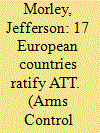

|
|
|
| 2 |
ID:
127862
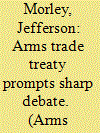

|
|
|
|
|
| Publication |
2013.
|
| Summary/Abstract |
A senior State Department official last month defended the Arms Trade Treaty, signed by the U.S. government in September, after 50 senators wrote to President Barack Obama saying they would oppose the pact. In the Oct. 15 letter, the senators charged that the treaty undermines U.S. credibility, threatens the rights of gun owners, and impinges on U.S. sovereignty. The lawmakers said they "cannot give [their] advice and consent to this treaty" and "do not regard the U.S. as bound to uphold its object and purpose."
|
|
|
|
|
|
|
|
|
|
|
|
|
|
|
|
| 3 |
ID:
131619
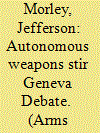

|
|
|
|
|
| Publication |
2014.
|
| Summary/Abstract |
The first multinational conference dedicated exclusively to robotic warfare took place May 13-16 at the UN Office at Geneva as governments around the world confront the emerging technologies that policymakers call "lethal autonomous weapons systems" and headline writers have dubbed "killer robots." The three-day meeting featured diplomats, scholars, and activists debating the implications of new weapons that could automatically target and kill people without human control. Although few such weapons exist now, revolutionary developments in sensors and robotics have stoked fears in some quarters that these weapons systems could make warfare less risky for the attacker and therefore more indiscriminate, but raised hopes in others that they might reduce civilian casualties.
|
|
|
|
|
|
|
|
|
|
|
|
|
|
|
|
| 4 |
ID:
128071
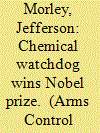

|
|
|
|
|
| Publication |
2013.
|
| Summary/Abstract |
The Organisation for the Prohibition of Chemical Weapons (OPCW) was awarded the Nobel Peace Prize on Oct. 11 for its efforts in eliminating the scourge of chemical warfare.
The honor boosted the Hague-based organization just 10 days after its personnel arrived in Syria on the most challenging mission of its 16-year history: dismantling the chemical arsenal of President Bashar al-Assad's besieged government.
In an Oct. 11 statement to the press, OPCW Director-General Ahmet Üzümcü, a former Turkish diplomat, said the OPCW operates "away from the glare of international publicity" while taking on the "onerous but noble task" of implementing the Chemical Weapons Convention, which took effect in 1997.
|
|
|
|
|
|
|
|
|
|
|
|
|
|
|
|
| 5 |
ID:
130342


|
|
|
|
|
| Publication |
2014.
|
| Summary/Abstract |
As the U.S. government winds up an interagency review of rules governing the export of large drones, the conflicting goals of nonproliferation and commerce are creating a new test of the 27-year-old Missile Technology Control Regime (MTCR). Observers do not expect big changes to the MTCR, which seeks to prevent the proliferation of unmanned systems capable of delivering weapons of mass destruction. The MTCR, a voluntary arrangement that now includes 34 countries, originally was intended to curb the spread of ballistic missiles and unmanned vehicles capable of carrying nuclear weapons. In 1993 it was amended to control systems carrying any weapons of mass destruction. It has become Washington's chief tool for controlling the spread of armed drones. "It's quite unlikely that we will see any radical change in the MTCR," Eric McClafferty, an attorney at Kelley Drye and Warren, a law firm in Washington that represents UAV manufacturers, said in a March 19 interview. "That said, there's a lot of pressure on the U.S. government to liberalize controls to make sure the U.S. doesn't get left behind in this market." The conflict has played out in a series of closed-door meetings over the last two months among the State, Defense, and Commerce departments as officials seek to update U.S. policy toward the burgeoning UAV market. Industry representatives have made their views known via technical committees that advise policymakers in these departments. "It's a pretty contentious fight" between the State Department's Bureau of International Security and Nonproliferation and the Pentagon's Defense Technology Security Administration, said Micah Zenko, a fellow at the Council on Foreign Relations, in a March 17 interview. The State Department says that "if you pull at the thread of MTCR, you will weaken the nonproliferation regime as a whole. The other side says the international market is going to supply these UAVs anyway," Zenko said. The heart of the issue is what kind of UAVs U.S. manufacturers can sell overseas. The MTCR imposes a "presumption of denial" for the export of so-called Category 1 UAV's, which are drones that can travel more than 300 kilometers with a payload of more than 500 kilograms. Drones that do not have those capabilities are classified as Category 2 UAVs and are not subject to such restrictive criteria. Two drones currently classified as Category 1-the Reaper, formerly known as the Predator, and the Global Hawk-have played a central role in U.S. aerial attacks on suspected Islamic militants in Pakistan, Somalia, and Yemen. Washington has approved the sale of an armed drone to only one country, the United Kingdom, although unarmed versions of these drones have been sold to Italy and South Korea.
The stakes of the MTCR review process are large politically and economically, observers say.
|
|
|
|
|
|
|
|
|
|
|
|
|
|
|
|
| 6 |
ID:
141317


|
|
|
| 7 |
ID:
129133
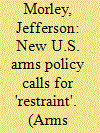

|
|
|
|
|
| Publication |
2014.
|
| Summary/Abstract |
The Obama administration in January announced a new policy on conventional arms transfers that emphasizes the need for restraint in considering transfers that might endanger regional security or human rights. President Barack Obama declared in a Jan. 15 directive that the new policy "supports transfers that meet legitimate security requirements of our allies and partners in support of our national security and foreign policy interests" and "promotes restraint" in those "that may be destabilizing or dangerous to international peace and security." The policy, which replaces a 1995 directive issued by President Bill Clinton, follows the administration's announcement last October that it was loosening rules on the sale of U.S.-made weapons overseas. The reforms announced last fall are part of an effort that the administration says will tighten controls on the sale of the most dangerous arms while enhancing commerce in defense material and services that are not threatening.
|
|
|
|
|
|
|
|
|
|
|
|
|
|
|
|
| 8 |
ID:
121724
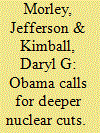

|
|
|
|
|
| Publication |
2013.
|
| Summary/Abstract |
President Barack Obama last month outlined a nuclear arms control agenda for his second term, calling for negotiated arms reductions with Russia, a fourth nuclear security summit, and a renewed push for treaties banning nuclear testing and the production of fissile materials.
|
|
|
|
|
|
|
|
|
|
|
|
|
|
|
|
| 9 |
ID:
128069
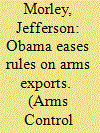

|
|
|
|
|
| Publication |
2013.
|
| Summary/Abstract |
In a little-noticed move Oct. 15, the U.S. government began to revamp its long-standing system for regulating the export of U.S.-made weapons ranging from submachine guns and night vision goggles to killer drones and fighter jets. The Export Control Reform Initiative, launched by the Obama administration in August 2009, will affect U.S. oversight of U.S. firms supplying the $83 billion global arms market. In an Oct. 15 statement, the White House said the initiative will end "the disproportionate focus on the least sensitive items such as nuts, bolts and screws instead of the most sensitive items"; encourage closer logistical collaboration with U.S. military allies and partners; and boost the U.S. defense industrial base.
|
|
|
|
|
|
|
|
|
|
|
|
|
|
|
|
| 10 |
ID:
131085
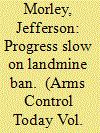

|
|
|
| 11 |
ID:
132786
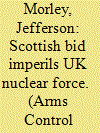

|
|
|
|
|
| Publication |
2014.
|
| Summary/Abstract |
The future of the United Kingdom's nuclear arsenal is in the hands of 4.1 million Scottish voters who go to the polls Sept. 18 to decide whether to end the country's 307-year union with England and become an independent country.
If the ballot proposal is approved, the ruling pro-independence Scottish National Party (SNP) has pledged to evict the UK fleet of four nuclear-armed submarines from the naval base at Faslane on Scotland's west coast by 2020. Having no comparable submarine base, the UK government would then face expensive choices about how to maintain its exclusively sea-based nuclear force.
"It would be an enormous exercise to reproduce the facilities elsewhere," the UK Ministry of Defence said in an October 2013 analysis of Scottish independence. "It would cost billions of pounds and take many years."
|
|
|
|
|
|
|
|
|
|
|
|
|
|
|
|
| 12 |
ID:
132784
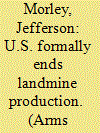

|
|
|
|
|
| Publication |
2014.
|
| Summary/Abstract |
The U.S. government announced on June 27 that it will not produce or acquire anti-personnel landmines and that it intends to join the global Mine Ban Treaty at some point in the future, a stance that did not satisfy activists and officials pressing to rid the world of landmines.
The U.S. government is "diligently pursuing…solutions that would be compliant" with the treaty and "that would ultimately allow us to accede" to it, Douglas Griffiths, the U.S. ambassador to Mozambique, said in a statement delivered at a review conference for the treaty being held in Maputo. The parties to the treaty, which entered into force in 1999, hold these conferences every five years.
Supporters of the treaty voiced disappointment throughout the conference that the United States has yet to join the treaty, which President Barack Obama endorsed as a U.S. senator in 2007. Although U.S. officials told reporters that their review of U.S. landmine policy, which began five years ago, is not completed, the announced changes fell short of proponents' hopes for U.S. accession to the treaty.
|
|
|
|
|
|
|
|
|
|
|
|
|
|
|
|
| 13 |
ID:
127546
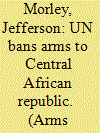

|
|
|
| 14 |
ID:
123543
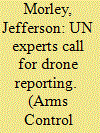

|
|
|
|
|
|
|
|